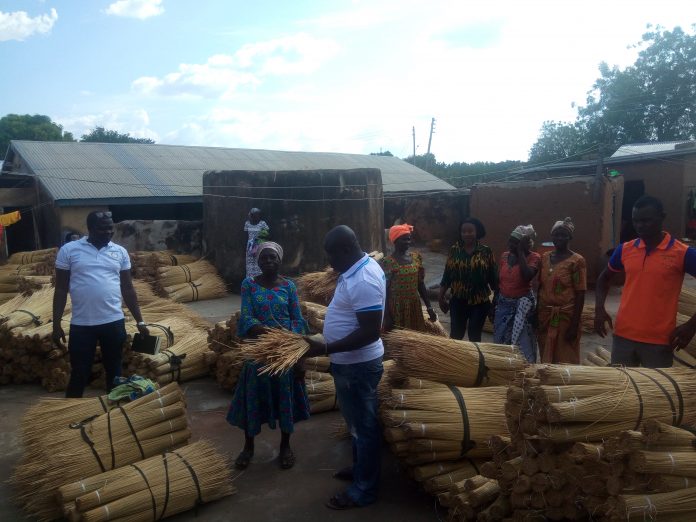
Some development watchers have warned thousands of people engaged in the straw industry in Ghana’s north could lose their jobs if nothing is done now to protect the industry’s basic raw material— the straw— from a looming disappearance.
The treasured grass, according to the observers, is going to disappear because its main source in the country’s southern area is not protecting it as a commercial priority. And when that happens, countless widows, who are trying to sustain their families on a livelihood derived from weaving of baskets and hats, would be the worst hit in the Upper East region, they say.
“It’s a huge industry, a big industry, feeding a lot of mouths in Upper East. Most of the women are into weaving of baskets and hats. Most of these women are underprivileged widows. The future of the industry is not too good for me because we don’t grow these straws here. They are being transported from Brong Ahafo. Those over there (Brong Ahafo) are not into the industry. They don’t weave basket. They only use them (the straws) to [mark] boundaries.
“This particular material is not being protected because those that are growing it are not using it. We use it here. If they destroy it one day or decide to use it for any other purpose, how is the industry going to survive? I’m looking at the sustainability of the industry,” said Dennis Anaba, Head of Anongtaaba Ghana, an organisation into rural development and headquartered in the Upper East region.
Organisation Proposes Way to Save the Industry from Shutdown
To save the industry from the ‘foreseeable’ demise in the Upper East region, Mr. Anaba suggested the region should be in control of the raw material— the straw. And one way to do that, he pointed out, is to grow it itself.
“We at Anongtaaba Ghana are trying to solicit funding from a donor agency to see how best we can conduct feasibility studies up north here to see how suitable it is to grow this raw material to be assured of the sustainability of this industry. Take note, if the material is no more available, there is going to be a serious crisis in the north here, particularly in the Upper East region, because most of these women depend on this industry. The poverty level is going to increase seriously.
“We are trying to put in a proposal to get funding to conduct feasibility studies so that at the end of the day, when we are able to grow them up here, one, it would guarantee the sustainability of the industry. Number two, it’s going to reduce cost because it’s going to be grown up here and by ourselves and the cost of transporting them from the southern sector to the north would reduce. The industry is going to be protected because the raw material is going to be under our control once we are growing it here,” Mr. Anaba stated.
505 Poor Weavers Get Straws Worth Gh¢100 Each
In October, this year, Anongtaaba Ghana identified some 505 poor weavers in the region, made up of 420 women and 85 men, and supported each of them with a bunch of straws worth Gh¢100 to keep them in the business.
“Anongtaaba Ghana is very young, not financially robust. The money used in acquiring the straws for the weavers is our own contribution and the little donation we had from other stakeholders to support them. The beneficiaries are supposed to pay back the money without any interest to enable us support another batch of needy weavers,” the Executive Director of the organisation, Nuhu Salifu, told Starr News.
The organisation, with technical support from the Business Sector Advocacy Challenge (BUSAC) Fund, trains local industries in the north how to manage time effectively, teaches them ways to produce efficiently and shows them how to penetrate both local and international markets. And in a bid to create more employment opportunities and to boost food security and reduce malnutrition in the north, it has drawn up plans to assist needy farmers to access tractor services for all-year-round farming and to acquire their own tractors with the costs of the machines paid in instalments.
“We thank Anongtaaba Ghana for coming to our aid. How to get straws to weave a basket was a problem. Now, they have acquired some straws for us. Even the mode of payment is almost like the offer is free. We are happy about the support. We are happy about the mode of payment,” said Jerry Apasiya, one of the beneficiaries.
Atarifila Akaribo, the leader of a basket-weavers’ group at Sumbrungu, a western suburb of the regional capital, Bolgatanga, thanked the organisation similarly, saying: “It was difficult to cater for our children as we were not getting the straws easily. We have some straws now. We can weave and pay their school fees.”
Source: Ghana/Starrfmonline.com/103.5FM/Edward Adeti




